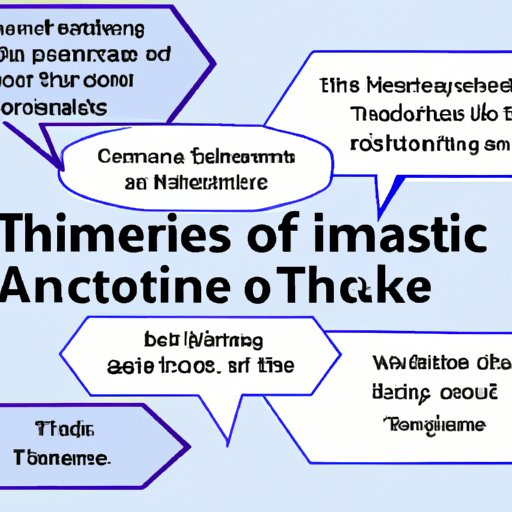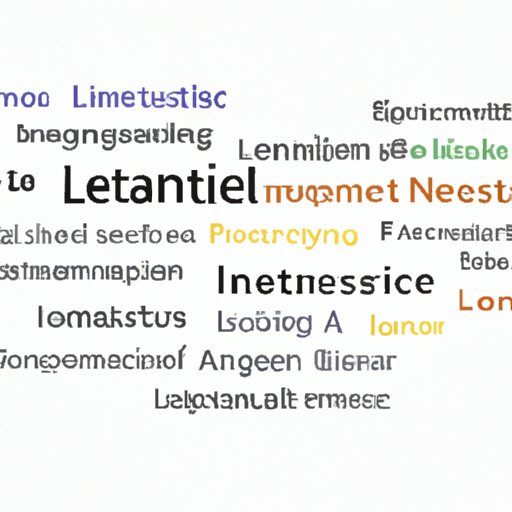Introduction
Theme is an important element in literature that helps to convey a message or lesson to readers. The definition of theme in literature is the underlying message or idea that is expressed through a story. It is often conveyed through symbols, characters, and plot points which all work together to reveal the author’s purpose. This article will explore what is the definition of theme in literature, as well as provide a comprehensive guide to understanding and analyzing themes in literature.

Exploring the Meaning of Theme in Literature
In order to better understand the definition of theme in literature, it is important to first explore what is a theme. In essence, a theme is the central idea or message that runs throughout a story. It is typically expressed through the events and characters in the story, as well as the tone and setting. It is important to note that themes are not necessarily explicitly stated, but rather implied or suggested through various literary devices.
Authors use themes to express their ideas about a particular topic or concept. They often use symbols, motifs, and other literary devices to help convey their message. For example, a story may have a theme of courage and perseverance, which is expressed through the characters’ actions and dialogue. Another example could be a story with a theme of love, which is expressed through the characters’ relationships and interactions.
Common themes in literature include good versus evil, love and friendship, courage and determination, coming of age, and the power of nature. These themes are often explored in various ways, such as through symbolism and allegory. Additionally, these themes are often seen in different genres, including fantasy, science fiction, romance, horror, and more.
A Comprehensive Guide to Understanding Themes in Literature
In order to properly analyze and understand themes in literature, there are a few key steps to follow. First, it is important to identify and analyze the theme. This can be done by looking at the characters, plot points, and other elements in the story. Pay close attention to any symbols or motifs that appear, as they can often be clues to the theme. Once the theme has been identified, it is then important to consider how the theme is used in the story and what its purpose is.
It is also important to understand the role of theme in literature. Themes are often used to explore complex topics and ideas, as well as to illustrate the author’s views on certain issues. They can also be used to create a sense of suspense or tension in a story, as well as to evoke emotion from the reader. Additionally, themes are often used to give the story a deeper meaning and to make the reader think more deeply about the narrative.

Deconstructing the Definition of Theme in Literature
To further understand the definition of theme in literature, it is important to look at the various literary devices used to explore them. Symbols, metaphors, and allusions are all common tools used by authors to represent themes. Additionally, imagery and characterization can also be used to explore themes. By looking closely at these elements, readers can gain a better understanding of the theme and the author’s message.
It is also important to consider the symbolic representations of themes. Many stories contain symbols that are used to represent the theme. For example, a rose may symbolize love and a dove may symbolize peace. By examining these symbols, readers can gain a deeper understanding of the theme and its implications.
What is the Role of Theme in Literature?
Theme plays a significant role in literature, as it helps to shape the story and the characters. It can influence character development and plot points, as well as create tension and suspense. Additionally, theme can contribute to the overall message or lesson of the story. By exploring themes, readers can gain insight into the author’s views and ideas.
Themes can also impact the narrative and how the story is told. For example, a story with a theme of love may focus on the characters’ relationships and their struggles to find true love. Alternatively, a story with a theme of loss may focus on the characters’ grief and how they cope with their losses. By exploring these themes, readers can gain a better understanding of the characters and their motivations.
Defining and Analyzing Theme in Literature
When analyzing and defining theme, it is important to distinguish between major and minor themes. Major themes are the primary ideas or messages expressed in the story, while minor themes are the secondary messages or ideas. Additionally, there are different types of themes, such as universal themes, which are applicable to all people, and cultural themes, which are specific to a certain group or culture.
When analyzing a story, readers should pay close attention to the various themes that are present. Look for symbols and motifs that may hint at the theme, as well as recurring patterns or ideas. Additionally, consider how the characters interact with each other and how their actions and dialogue may suggest a particular theme.

Unpacking the Significance of Theme in Literature
In order to fully appreciate the definition of theme in literature, it is important to understand the connection between theme and message. The theme of a story is often used to express the author’s message or opinion. Additionally, it can be used to illustrate the consequences of certain decisions or actions. By exploring the theme, readers can gain a deeper understanding of the story and its implications.
Finally, it is important to evaluate the impact of theme on the reader. Themes can evoke powerful emotions from readers, such as joy, sorrow, anger, and more. Additionally, they can challenge readers to think more deeply about the narrative and its implications. By exploring themes, readers can gain a better understanding of the story and the author’s message.
Conclusion
In conclusion, theme is an important element in literature that helps to convey a message or lesson to readers. The definition of theme in literature is the underlying message or idea that is expressed through a story. This article has explored what is the definition of theme in literature, as well as provided a comprehensive guide to understanding and analyzing themes in literature. By exploring the various literary devices used to explore themes, as well as the role of theme in literature, readers can gain a better understanding of the author’s message and the implications of the story.
(Note: Is this article not meeting your expectations? Do you have knowledge or insights to share? Unlock new opportunities and expand your reach by joining our authors team. Click Registration to join us and share your expertise with our readers.)
